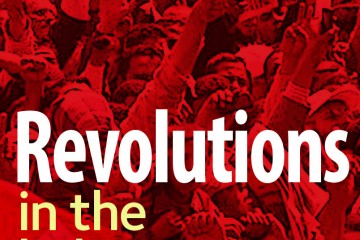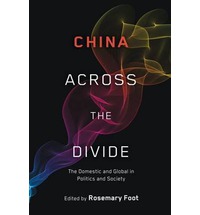
New issue of St Anthony’s International Review
St Antony’s International Review (STAIR) is proud to announce the publication of its 19th issue, “Thinking Beyond the State: Emerging Perspectives on Global Justice”. The launch event will take place on 17th June 2014 at 5 p.m. in the Department for Politics and International Relations at the University of Oxford. More information on the event can be found here.
In this issue, we ask, how should processes of neoliberal globalisation make us think about global justice beyond the state? There are broadly two possible approaches to this question. First, we might turn from the state to supra-national state institutions. Second, we might think beyond state institutions as such. The academic global justice debate has tended to focus on the first approach. With this issue we intend to broaden the debate by taking seriously the potential of non-statist political and social movements to address global injustices.

Central Government Makeovers
Have repeated ‘makeovers’ created a government machine in the UK that works better and costs less? Or has a relentless focus on cost-cutting damaged traditional administrative values? In a wide-ranging study of UK central government, we found that not only did formal complaints and legal challenges to central government rise sharply over the three decades up to 2010, but government administration costs also increased by two-fifths in real terms – even though the civil service lost a third of its staff. They conclude that traditional headcount reduction measures do not guarantee a reduction in costs and may lead to more complaints and challenges. We question why government makeovers so rarely start by carefully identifying what citizens actually complain about.

National Dialogues and Dilemmas: Reflections on Libya and Yemen
The Arab uprisings, initially perceived as one unit of analysis, have gone through a rite of passage and identified themselves as distinct from one another; it is no longer logically sound to talk of one “spring”. Nevertheless, it is instructive to extract lessons learned from each experience and place them into conversation with one another. An Arab dialectic seems possible instead of a unified discourse on change and transitions. Libya’s ‘national dialogue’ has been launched in the hope of carving out a space of peace across the country and for developing a form of consensus on what is perceived as a reborn Libyan nation, post-Qaddafi. The National Dialogue Preparatory Commission’a (NDPC) Chairman Fadeel Lame emphasised that Libya needs to “move from one stage to another and from one situation to another and that this transition could be achieved only through the power of dialogue.”[1] Earlier in September 2013, Tarek Mitri, who heads the UN Support Mission in Libya, described it as a process that “would give voice to many Libyans and opens a space that does not exclude any of those who may have contributions to make to public life and are otherwise isolated, separated or entrenched in their partisan attitudes… [to] promote a national capacity to address urgent priorities and ensure public support to the efforts of state-building.”
The need for dialogue is indisputable in a country that seems ridden with conflict. In Tripoli, separatist movements gaining ground in the eastern part of the country. General instability highlights the urgency for dialogue – and the difficulties. Recently, militias from Misrata opened fire on peaceful protestors in Tripoli who were calling for the departure of militias and the restoration of peace. According to one account, more than 40 were killed and 400 wounded in the clashes.[2] The General National Congress (GNC) and government agencies froze; it was only through the intervention of local councils and civil society that an end of violence was reached.[3] As described by the reporter: “There was a tense calm in Tripoli on Sunday after more than 48 hours of bloodshed. Civil-society and community leaders abided by a general strike that coincided with a national mourning period for those slain. Shops were shut and normally busy commercial streets were devoid of traffic on the first day of the working week, witnesses reported.”
The question here then is not about need – in an ideal world, developing consensus among the Libyan people towards state building and a national identity would be the way out.
It is about capacity.

One Year In: Assessing the 19th Knesset
The last legislative elections in Israel were held one year ago today. If the 19th Knesset survives a full four-year term, it is now quarter-way through its life. It is far too early to begin predicting the results of the next election, but this is an opportune moment to examine the changing contours of the Israeli political map, and see to what extent the big stories of the last year have changed Israelis’ opinions about the leadership they want for their country. Eylon Aslan-Levy looks at the polls to examine how the fortunes of Israel’s political parties have altered in the year after the last elections.

Q&A with Dr Cristina Parau: Why do politicians let judges have so much power?
Dr Cristina Parau, Department Lecturer in European Politics and Societies at Oxford University, recently edited a special issue of the journal Representation. This issue focuses on the phenomenon of judicial activism in the political sphere. It brings together scholars from different disciplines that hold different perspectives on the judicialisation of politics. It focuses on the contrasts and complementarities of law and politics as modes of democratic representation.
According to Dr Parau, “this special issue seeks to advance our understanding of the judicialisation of politics by bringing together a diverse group of scholars who take different perspectives and apply different methods to investigating the phenomenon and and its impact on representative democracy. The transfer of policy-making power from popularly elected representatives to a judicial elite would seem to weaken democracy in a quite straightforward, zero-sum way, contributing to Europe’s already destabilising democratic deficit. On this account, a renewal of parliamentarism is the only effectual and legitimate cure. On the other hand, ‘representative democracy’ has been criticised since the eighteenth century as elite rather than popular rule; Aristotle classified it as ‘oligarchy’. Representation has defects that might be remedied by judicial intervention. Some scholars have suggested that judicialisation provides a venue for the more active participation of citizens marginalised by the failures of representation; while others even see in judges a form of representativeness with unique properties. The articles in this Special Issue probe these accounts.”
I recently asked her a few questions about the project.

Q&A: China Across the Divide: the domestic and global in politics and society
I recently interviewed Professor Rosemary Foot about her new book, China Across the Divide: the domestic and global in politics and society (New York: Oxford University Press, 2013), as part of Politics and Spires’s OxOn China series.
NH: What is the book about?
RF: The book’s main argument is that, as students of international relations, we need to do more to collapse the divide between the domestic and global spheres of analysis. I make this argument with special reference to China, but I think it can be applied to other countries. I have chosen three main approaches to illustrate this phenomenon of the interconnectedness between the global and domestic levels of analysis. The first section of the book looks at ideas emerging from within China itself, at both mass and elite levels, about the country’s place in the world and how it should conduct its external relations. The argument is not that these ideas determine policy decisions, but help to shape, or set the broad contours of, the decisions that are arrived at. The second section looks at involvement in inter-societal enmeshments between China and other countries, and both the intended and unintended consequences of these linkages. This part of the book looks at the ways in which these non-state relations are transforming not only China itself but also the world of which it is a part. The third section focuses on three major global issues that are salient or intrusive at the domestic level and which require either some alterations in domestic ways of life or generate resistance at the domestic level to that intrusiveness.
NH: What inspired you to write/edit it?

Exit strategies and state building: an interview with Richard Caplan
Professor Richard Caplan, of the DPIR, Oxford, and editor of the new book Exit Strategies and State Building, talks to Politics in Spires about the book itself, the practice of internationally-led state-building and strategies for exit. In this interview, Professor Caplan talks about the practical and normative changes that have taken place in the international arena which this book has responded to and deals with some of the most pertinent issues faced by the international community when attempting to undertake state-building projects.

What Next for Britain’s Pro-Europeans?
Having, until now, benefited from the tacit support of the existing political elite, Britain’s pro-European lobby has had less incentive to create a formal political movement. However, if the anti-European jungle drums continue to beat louder, it seems only a matter of time before the pro-Europeans organise, perhaps in advance of the June 2014 European elections.









